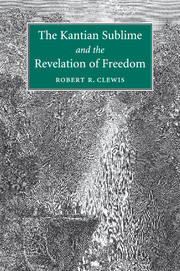Book contents
- Frontmatter
- Contents
- Preface and acknowledgments
- Abbreviations and notes on Kant's texts
- Introduction
- 1 The Observations and the Remarks
- 2 The judgment of the sublime
- 3 Moral feeling and the sublime
- 4 Various senses of interest and disinterestedness
- 5 Aesthetic enthusiasm
- 6 Enthusiasm for the idea of a republic
- 7 Conclusion
- Appendix 1 On the Remarks
- Appendix 2 Some features of the feelings discussed in this book
- Appendix 3 Classification of what elicits sublimity
- Bibliography
- Index
1 - The Observations and the Remarks
Published online by Cambridge University Press: 02 July 2009
- Frontmatter
- Contents
- Preface and acknowledgments
- Abbreviations and notes on Kant's texts
- Introduction
- 1 The Observations and the Remarks
- 2 The judgment of the sublime
- 3 Moral feeling and the sublime
- 4 Various senses of interest and disinterestedness
- 5 Aesthetic enthusiasm
- 6 Enthusiasm for the idea of a republic
- 7 Conclusion
- Appendix 1 On the Remarks
- Appendix 2 Some features of the feelings discussed in this book
- Appendix 3 Classification of what elicits sublimity
- Bibliography
- Index
Summary
In this chapter I examine Kant's views of the sublime, enthusiasm, moral feeling, and freedom in the Observations and the Remarks (1764–6), the collection of notes Kant wrote a year or two after the publication of the Observations in 1764. One reason to study Kant's early accounts is that many of the same themes and theses reemerge in the Critical period. We can understand the Critical account better if we understand Kant's early reflections on these issues. It is interesting to examine Kant's understanding of freedom in this period and to see how he relates the sublime to freedom.
The discussion of the Observations will be relatively brief, however, since the text has been relatively well examined by the literature, especially with regard to those themes that are important to the development of Kant's ethics, such as the adoptive virtues and moral feeling. I will focus on the connections between morality and sublimity, enthusiasm, and the grotesque, themes that are largely neglected by the scholarship on the Observations. After discussing the background of the Remarks, I will show that the notes characterize enthusiasm as the passion of the sublime and also contain four distinct conceptions of freedom.
This chapter is divided into two basic partitions: sections 1.1 to 1.3 examine the Observations, while sections 1.4 to 1.6 discuss the remarks to the Observations.
- Type
- Chapter
- Information
- The Kantian Sublime and the Revelation of Freedom , pp. 32 - 55Publisher: Cambridge University PressPrint publication year: 2009



